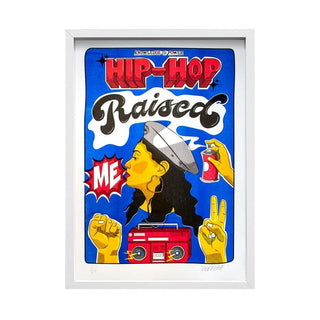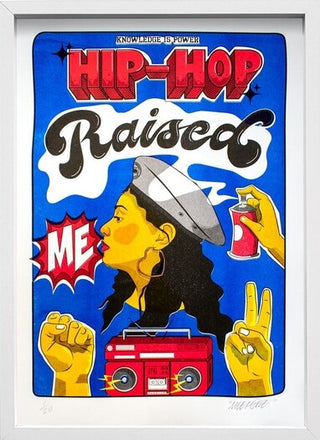Meep - M/K Press x Fiksate (framed)
Risograph print on Fabriano 200gsm paper, 420 x 297mm (A3) + frame
Individually signed and numbered by the artist. Limited edition of 20 prints.
An M/K Press x Fiksate exclusive artist collaboration! These limited edition risograph prints are released monthly and feature collaborations with New Zealand’s finest Urban Artists. Read more here.
About the Artist:
Meep (Kophie Hulsbosch) is a Christchurch-based artist whose work spreads across a diverse range of fields, including graphic design, illustration, painting, graffiti and clothing design. This output is heavily influenced by hip hop culture, low-brow art and the issue of sustainability. A central intention in her work is the disruption of the status quo, reflected in her graffiti and her clothing brand Future Apparel which is a response to the mass production and other ongoing issues evident in the fashion industry.
About the Artwork:
“Hip Hop Raised Me” is a reflection of my experience growing up listening to Hip-Hop and what it taught me and how in all its forms is used by people as a means of self-expression, especially within marginalised groups of people. It is also a reflection on the current climate and the discussions of racism happening worldwide. I wanted to focus my intention of this artwork on NZ racism towards Pacific people and to acknowledge my Samoan descent and history. I used my close friend also with Samoan descent as the central image, representing the Polynesian Panthers signature hat.
“In the 1950s thousands of Pacific Islanders came to Aotearoa to meet a labour shortage. They faced racism, and in the 1970s, notorious dawn raids by police. In 1971 a group of young gang members and students set up the Polynesian Panthers to stand up for the rights of the Pasifika community.”
Not only is the representation of Pacific people in this piece is important but the major role that Hip Hop has played in a lot of marginalised groups is to use their voice and express creativity, in particular Maori and Pacifica, who use the art form and incorporate their own heritage and culture into it. Hip Hop is especially used to express views on racism, politics, social issues, economics and so much more but hip-hop has been stigmatised as misogynistic and violent e.t.c because of the artists they orchestrate and choose to show on mainstream media.
I have chosen to donate half of my share of the sale of these prints to Yemen Children’s Crisis through Unicef.
“What’s happening in Yemen?
Yemen is the largest humanitarian crisis in the world, with more than 24 million people – some 80 percent of the population – in need of humanitarian assistance, including more than 12 million children. Since the conflict escalated in March 2015, the country has become a living hell for the country’s children. With COVID-19 now spreading rapidly, Yemen is facing an emergency within an emergency. Sanitation and clean water are in short supply. Only half of health facilities are functioning, and many that remain operational lack basic equipment like masks and gloves, let alone oxygen and other essential supplies to treat the coronavirus. Many health workers are receiving no salaries or incentives, and 10.2 million children don't have access to basic healthcare.”
Meep - M/K Press x Fiksate (framed)
Risograph print on Fabriano 200gsm paper, 420 x 297mm (A3) + frame
Individually signed and numbered by the artist. Limited edition of 20 prints.
An M/K Press x Fiksate exclusive artist collaboration! These limited edition risograph prints are released monthly and feature collaborations with New Zealand’s finest Urban Artists. Read more here.
About the Artist:
Meep (Kophie Hulsbosch) is a Christchurch-based artist whose work spreads across a diverse range of fields, including graphic design, illustration, painting, graffiti and clothing design. This output is heavily influenced by hip hop culture, low-brow art and the issue of sustainability. A central intention in her work is the disruption of the status quo, reflected in her graffiti and her clothing brand Future Apparel which is a response to the mass production and other ongoing issues evident in the fashion industry.
About the Artwork:
“Hip Hop Raised Me” is a reflection of my experience growing up listening to Hip-Hop and what it taught me and how in all its forms is used by people as a means of self-expression, especially within marginalised groups of people. It is also a reflection on the current climate and the discussions of racism happening worldwide. I wanted to focus my intention of this artwork on NZ racism towards Pacific people and to acknowledge my Samoan descent and history. I used my close friend also with Samoan descent as the central image, representing the Polynesian Panthers signature hat.
“In the 1950s thousands of Pacific Islanders came to Aotearoa to meet a labour shortage. They faced racism, and in the 1970s, notorious dawn raids by police. In 1971 a group of young gang members and students set up the Polynesian Panthers to stand up for the rights of the Pasifika community.”
Not only is the representation of Pacific people in this piece is important but the major role that Hip Hop has played in a lot of marginalised groups is to use their voice and express creativity, in particular Maori and Pacifica, who use the art form and incorporate their own heritage and culture into it. Hip Hop is especially used to express views on racism, politics, social issues, economics and so much more but hip-hop has been stigmatised as misogynistic and violent e.t.c because of the artists they orchestrate and choose to show on mainstream media.
I have chosen to donate half of my share of the sale of these prints to Yemen Children’s Crisis through Unicef.
“What’s happening in Yemen?
Yemen is the largest humanitarian crisis in the world, with more than 24 million people – some 80 percent of the population – in need of humanitarian assistance, including more than 12 million children. Since the conflict escalated in March 2015, the country has become a living hell for the country’s children. With COVID-19 now spreading rapidly, Yemen is facing an emergency within an emergency. Sanitation and clean water are in short supply. Only half of health facilities are functioning, and many that remain operational lack basic equipment like masks and gloves, let alone oxygen and other essential supplies to treat the coronavirus. Many health workers are receiving no salaries or incentives, and 10.2 million children don't have access to basic healthcare.”





